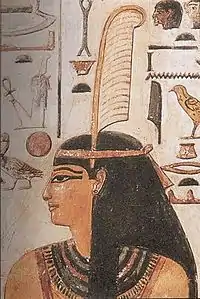mꜣꜥt
Egyptian

The goddess
, personification of truth and right
Etymology
An abstract noun formed from mꜣꜥ (“to direct, to be just, to be true”) + -t (“feminine ending”).
Pronunciation
- (reconstructed) IPA(key): /ˈmuʀʕat/ → /ˈmuʀʕaʔ/ → /ˈmuːʕa/ → /ˈmeːʕə/[1]
- (modern Egyptological) IPA(key): /mɑʔɑːt/
- Conventional anglicization: maat
Noun
f
- truth
- right action, righteousness, virtue
- c. 1550 BCE – 1295 BCE, Great Hymn to Osiris (Stela of Amenmose, Louvre C 286) lines 23–24:
![S29 [s] s](../I/hiero_S29.png.webp)
![Y5 [mn] mn](../I/hiero_Y5.png.webp)
![N35 [n] n](../I/hiero_N35.png.webp)

![C10 [mAat] mAat](../I/hiero_C10.png.webp)
![N35 [n] n](../I/hiero_N35.png.webp)
![V30 [nb] nb](../I/hiero_V30.png.webp)
![O34 [z] z](../I/hiero_O34.png.webp)
![D21 [r] r](../I/hiero_D21.png.webp)
![D36 [a] a](../I/hiero_D36.png.webp)
![G43 [w] w](../I/hiero_G43.png.webp)


![D21 [r] r](../I/hiero_D21.png.webp)
![M17 [i] i](../I/hiero_M17.png.webp)
![S29 [s] s](../I/hiero_S29.png.webp)
![I9 [f] f](../I/hiero_I9.png.webp)
![X1 [t] t](../I/hiero_X1.png.webp)
![G37 [nDs] nDs](../I/hiero_G37.png.webp)
- smn mꜣꜥt n nb.s rdjw sꜣ r jsft
- Righteousness has been established for its possessor, and the back is turned on wrong.
- blamelessness, innocence
- justice, fairness
- right order in the state or cosmos
Derived terms
Descendants
Derived terms
Descendants
- → English: Maat
References
- Erman, Adolf, Grapow, Hermann (1926–1961) Wörterbuch der ägyptischen Sprache, Berlin: Akademie-Verlag, →ISBN
- James P[eter] Allen (2010) Middle Egyptian: An Introduction to the Language and Culture of Hieroglyphs, 2nd edition, Cambridge: Cambridge University Press, →ISBN, pages 97, 99, 119–121, 126, 214, 254, 273, 277, 281.
- Hoch, James (1997) Middle Egyptian Grammar, Mississauga: Benben Publications, →ISBN, page 112
- Loprieno, Antonio (1995) Ancient Egyptian: A Linguistic Introduction, Cambridge: Cambridge University Press, →ISBN, pages 39, 47
This article is issued from Wiktionary. The text is licensed under Creative Commons - Attribution - Sharealike. Additional terms may apply for the media files.